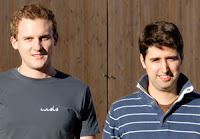 A mathematical trick may allow people to scatter their computer files across the world's hard disks
A mathematical trick may allow people to scatter their computer files across the world's hard disks
IF YOU have lots of unused storage space on your hard disk, then why not share it with others on the internet? The benefit could be distributed storage for your own files, making them available any time via the web, even if you are nowhere near your computer—indeed, even if your computer is switched off. That desideratum is what a Zurich-based firm called Caleido is aiming to provide, with a free online storage service known as Wuala that was recently introduced to the public.
Though the idea underlying it is simple, Wuala requires some nifty technology to make its distributed system work reliably. In particular, its developers, Dominik Grolimund and Luzius Meisser, have used a clever mathematical trick to compensate for the fact that the participating computers will come and go from the internet in an unpredictable way.
The challenge is how to minimise the number of copies of the same file that have to be distributed. Copying costs participants both storage space and bandwidth. Yet there have to be enough copies to ensure that there is at least one available most of the time. If, for example, each computer is online 25% of the time, then a quick calculation shows that you would have to copy each file to 100 different computers to ensure that 999,999 times out of a million there is at least one copy available when a user looks.
For more on this article, please click on the following link: Thanks for the memory: Economist



No comments:
Post a Comment